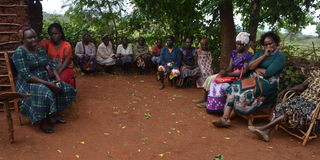Premium
In this Tharaka Nithi village, mob justice is the 'law'

Residents of Nthinkuru in Tharaka constituency, Tharaka Nithi County at the home of Mr Silas Gitonga who was murdered on June 8, 2020. Mr Gitonga was allegedly hacked to death by a neighbour, Mr Samuel Nthiga, who was later lynched by irate residents.
What you need to know:
- Within a month, five suspected thieves have been lynched in Turima division alone, raising concerns as to why mob justice has become an attractive option for dealing with suspected criminals.
- Some cases have been reported of suspected criminals being forced to drink petrol and before they are set ablaze still alive.
On a hot afternoon two weeks ago, in an obscure village in Tharaka Nithi County, the life of a 17-year-old boy came to a brutal end.
Suspected of stealing from a shop at Kibung’a market, the teenager was cornered by the owners.
Seemingly out of nowhere, a crowd quickly gathered and, before long, the boy was dead. He had been kicked, stoned, hacked, run over and set ablaze. His remains were unrecognisable.
Barely a week later in the same area, two men suspected of stealing a cow were similarly executed by a mob.
In Tharaka Nithi, suspected criminals rarely get a fair hearing once they are arrested by members of the public; their punishment swiftly executed by blood-thirsty lynch mobs.
On June 7, 2020, angry residents of Nthinkuru village in Tharaka Nithi County stoned to death a 38-year-old man for reportedly killing his 70-year-old neighbour.
Police said Mr Samuel Nthiga stormed Mr Silas Gitonga's house and hacked him to death, accusing him of letting his chicken enter into his green gram farm.
After committing the heinous crime, Mr Nthiga carried the body using a wheelbarrow towards Thanantu River but was spotted by children who raised alarm before he could throw it into the water.
On receiving the information, villagers pursued the victim, arrested him as he tried to escape towards Marimanti town using a motorbike and stoned him to death before setting his body ablaze.
Tharaka South police boss Kiprop Rutto said upon receiving the information, his officers rushed to the village and found residents had already killed the suspected murderer. Mr Rutto warned residents against taking the law into their hands and killing suspected criminals.
Known criminal
Nthiga's brother, Mr Peter Rwanda, said his deceased sibling was a known criminal who had served several jail terms for various crimes, including causing grievous harm on his father and wife’s brother.
“Our brother was a known criminal and never cooperated with other villagers or even family members,” said Mr Rwanda.
More recently, within a month, five suspected thieves have been lynched in Turima division alone, raising concerns as to why mob justice has become an attractive option for dealing with suspected criminals, especially in rural areas that have been presumed to have effective institutions for reforming behaviour.
Members of the public are taking the law into their hands by forcing suspected criminals to drink petrol and then setting the victims ablaze while still alive. A cruel and brutal end to life.
The practice is largely associated with urban areas that are believed to have little tolerance to deviance.
However, this trend is now increasingly being witnessed in environments that are typically rural.
In most cases, members of the public make sure that the authorities are not informed when a suspected criminal is cornered until they are done with him or her.
In most cases, police are only called in to collect the bodies.
Dr Christopher Kiboro, a sociologist at Chuka University, says mob justice is a form of collective behaviour, which has become a common feature of society and often attracts much public attention when it occurs.
“A mob is an emotionally charged collectivity whose members are united by a specific destructive or violent goal. Mobs are generally destructive and challenge authority as well as threaten social order,” Dr Kiboro said during an interview with the Nation.
He associated the trend with weakness in the criminal justice system in a country that is characterised by corruption, ineptitude, unresponsiveness, and indifference to people's needs. This leaves people with no other option but to take matters into their own hands.
Dr Kiboro says when a well-known criminal can buy his or her freedom, the community will have no reason to report offenders.
Innocent victims
He also says that the traditional mechanisms for dispute resolution, which offer an alternative to the criminal justice system, have also been eroded and rendered ineffective, allowing people to deal with offenders as they wish.
Mr Silas Kariuki, a criminologist and a security officer working with Tharaka Nithi County Assembly as the sergeant-at-arms, agrees with Dr Kiboro that people have lost confidence in the country’s criminal justice system.
He says people are always frustrated when known criminals are allowed to continue terrorising them in villages even after being arrested and handed over to police.
“It is true, people are losing trust in the criminal justice system and this explains why they have resorted to mob justice,” said Mr Kariuki.
He says that, unfortunately, innocent people are sometimes lynched by the mobs which never give them a fair hearing.
Tharaka Nithi County Police Commander Charles Mbatu says he is engaging community policing and other community leaders to help curb incidents of mob justice.
“Any suspected criminals must be handed to police for the due process of law to take place,” said Mr Mbatu.
However, there are reports of cases where suspected criminals has been apprehended by members of the public and the police alerted only for the law enforcers to delay in responding.
Police have also been blamed for failing to take action on instigators of mob justice.





